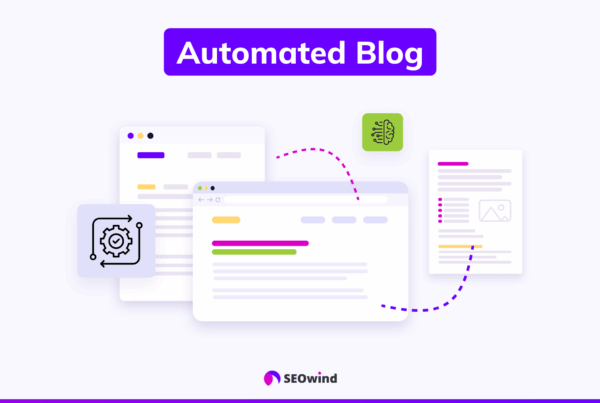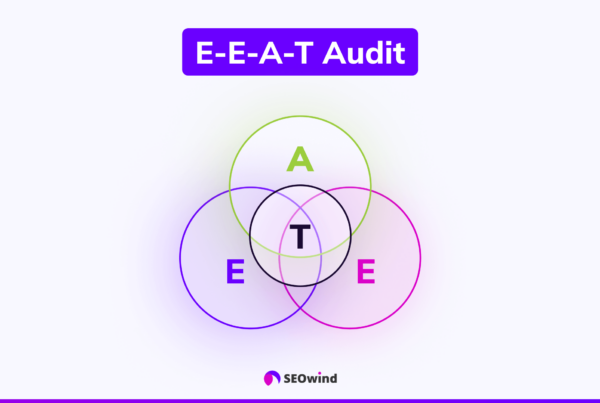Topical authority has become critical to success. It’s no longer enough to rank for just a few keywords; the goal is to become the go-to source for an entire topic. By mastering topical authority, your website can dominate your niche and establish itself as a trusted expert.
Search engines now look for websites that demonstrate in-depth knowledge across related subjects, not just single pages. Building topical authority has become essential if you want to stay competitive.
Ready to learn how to use topical authority to boost your rankings and become the top resource in your field?
The Significance of Topical Authority in SEO

Topical authority in search engine optimization (SEO) is like being the smartest kid in class but for your entire subject area. It’s about showcasing your expertise on a whole range of related subjects. And let me tell you, it’s a game-changer for SEO.
Why does topical authority matter so much? Well, search engines are getting smarter by the day. They’re not just looking at individual pages anymore; they’re assessing your entire website to determine how much of an expert you are.
Faster Traffic Growth with Topical Authority
According to a study by Graphite (Can this be linked?), “Content with high Topical Authority generates traffic significantly faster than content with low Topical Authority.” This isn’t just a small boost—it’s a significant advantage in the race for organic traffic.
The Numbers Don’t Lie
Let’s back that up with some numbers. Wix SEO reports (Link if possible), “Websites with higher topical authority gained traffic 57% faster than websites with low topical authority.” That’s more than half the time saved in growing your traffic! Imagine getting to your traffic goals nearly twice as fast just by focusing on building your topical authority.
Broader Keyword Coverage
Topical authority also helps you cast a wider net. When you’re seen as an authority on a topic, you’re more likely to rank for a broader range of keywords, including those you haven’t specifically targeted.
Building Trust with Search Engines and Users
Moreover, topical authority builds trust with search engines and users. When visitors see that you offer in-depth, comprehensive coverage of a topic, they’re likelier to stick around, explore your site, and return for more. This increased engagement sends positive signals to search engines, further boosting your authority and rankings.
How Search Engines Evaluate Topical Authority

Search engines have become incredibly sophisticated in how they evaluate and rank websites. When it comes to SEO topical authority, these algorithms are particularly discerning. They’re not just looking at individual pages anymore; they’re assessing the entire website’s ecosystem to determine its level of expertise on a given topic.
Depth and Breadth of Content
One key way search engines prioritize sites with topical authority is by analyzing the depth and breadth of content. They’re looking for websites that cover a topic comprehensively, touching on various related subtopics and providing valuable insights. However, quality is paramount. Search engines are adept at recognizing well-researched, original content that delivers more value to users.
Speed of Visibility for Topical Authority
Topical authority can also dramatically speed up your visibility in search results. According to a study by Graphite, High Topical Authority significantly decreases time to visibility, which refers to how quickly an article earns its first impression and first click. Building topical authority can help your content get noticed faster, giving you a competitive edge in the fast-paced world of SEO.
Quick Results from High Topical Authority
But it gets even better. Wix SEO reports, “High topical authority increased the percentage of pages that got their first click within three weeks of publishing.” This is a game-changer for content creators and marketers looking for quick results from their efforts.
The Importance of Content Structure
Search engines also look at the structure of your content. They favor sites that organize their information logically, using topic clusters and pillar pages to create a coherent content hierarchy. This structure helps search engines understand your content better and improves the user experience, which is another crucial ranking factor.
The Concept of E-E-A-T and Its Relationship with Topical Authority
E-E-A-T, which stands for Experience, Expertise, Authoritativeness, and Trustworthiness, is a concept that’s closely tied to topical authority. It’s a set of guidelines Google uses to assess the quality of content and websites. Let’s break down how each component relates to topical authority:
- Experience: Demonstrate first-hand or life experience with a topic. For topical authority, this means showing you have practical, real-world knowledge in your niche.
- Expertise: Share specialized knowledge or skill in a particular field. Building topical authority involves showcasing your expertise across a range of related topics.
- Authoritativeness: Earn recognition as a go-to source in your field. As you build topical authority, you’ll establish yourself as an authoritative voice in your niche.
- Trustworthiness: Ensure the accuracy, transparency, and reliability of your content. Topical authority helps build trust by consistently providing high-quality, accurate information.
Focusing on building topical authority ticks all the boxes for E-E-A-T. Doing so enables the creation of in-depth, expert content that covers your topic from multiple angles. This helps search engines understand your expertise and builds trust with your audience.
Search engines are getting better at understanding context and relevance. Today, they look beyond just keywords to assess whether a site truly understands a topic and can provide valuable information to users. By prioritizing topical authority and aligning with E-E-A-T principles, your site will become a valuable resource that search engines will want to recommend to their users.
Topical Authority vs. Domain Authority: Understanding the Difference
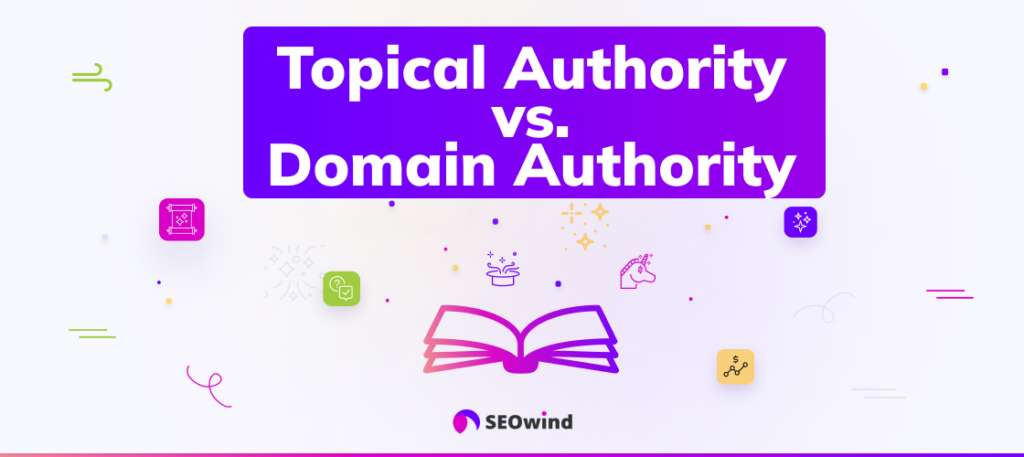
When discussing SEO authority, we have to understand the distinction between topical authority and domain authority. While both play a significant role in determining your website’s standing in search engine results, they focus on different aspects of your online presence.
What is Domain Authority?
Let’s start with domain authority. Originally developed by Moz, this concept is a score that predicts how well a website will rank on search engine result pages (SERPs). It’s based on various factors, including the number and quality of inbound links, the age of the domain, and the overall SEO health of the site. Essentially, domain authority is a measure of the entire website’s strength in the eyes of search engines.
Domain Authority vs. Topical Authority
While a high domain authority can certainly help your SEO efforts, it doesn’t guarantee you’ll rank well for every topic you write about. This is where topical authority comes into play. You might have a relatively new site with lower domain authority. But if you’ve built strong topical authority in your niche, you could outrank older, more established sites when it comes to specific topics.
Think of it this way: domain authority is like your overall reputation in a large community, while topical authority is your standing as an expert in a particular field. Both are valuable, but they serve different purposes in your SEO strategy.
Measuring Topical Authority
It’s also worth noting that while domain authority is a metric you can easily check, topical authority is more nuanced. It’s determined by the depth, breadth, and quality of your content on specific topics and how well you interlink that content to create comprehensive topic clusters.
Building Both Types of Authority for SEO Success
Authority is vital, whether domain-wide or topic-specific. A solid SEO strategy should attempt to build both types of authority. To build topical authority, focus on creating high-quality, in-depth content around your core topics. Meanwhile, you should work on overall site health, user experience, and link building to boost your domain authority.
Remember, it’s not an either/or situation. The most successful websites in search results often have strong domain and topical authority in their specific niches. Understanding and leveraging both concepts enable a powerful SEO strategy that positions your site as a trusted, authoritative source.
How to Build Topical Authority and increase SEO

Step 1: Identify Relevant Topic Clusters within Your Niche
The first step of building topical authority is identifying your niche’s main topics and subtopics. This process involves creating topic clusters, which are groups of interrelated content that collectively cover a broad subject area. Start by listing your main topics, then branch out into related subtopics. This approach ensures your content strategy is comprehensive and topically relevant.
Step 2: Conduct In-depth, Topic-Based Keyword Research
Once you’ve identified your topic clusters, it’s time to start keyword research. Look for keywords that are popular and topically relevant to your niche. This step is crucial to understanding what your audience is searching for and how they’re phrasing their queries. Tools like SEMrush, Ahrefs, or Google’s Keyword Planner can be invaluable for this.
Step 3: Create an Engaging and Authoritative Content Strategy
With your topics and keywords established, you’re ready to craft a content strategy. According to Ahrefs, Building topical authority involves covering all the obvious SEO basics, doing keyword research, organizing data into topic clusters, and producing content that meets search intent.” Your strategy should focus on creating high-quality, in-depth content that thoroughly covers each topic and subtopic in your cluster.
Step 4: Incorporate User Intent into Your Content
Understanding and addressing user intent is crucial when creating topical content. Ask yourself what users are looking for when they search for this topic. Are they seeking information, looking to make a purchase, or trying to solve a problem? Tailor your content to meet these needs, ensuring it’s informative, useful, and actionable.
Step 5: Utilize Subtopics to Enhance Content Depth
To truly establish topical authority, you need to go beyond surface-level information. Dive deep into subtopics, exploring various angles and providing comprehensive coverage. This approach demonstrates your expertise and helps capture long-tail keywords and answer specific user queries.
Step 6: Strategize Internal Linking with Content Clusters
Internal linking is a powerful tool for building topical authority. Create a web of interconnected content by linking related articles within your topic clusters. This strategy helps search engines understand the relationship between your different content and reinforces your authority on the subject.
Step 7: Adopt a Data-Backed Approach for External Link Building
While internal linking is crucial, don’t neglect external link building. Seek opportunities to guest post on reputable sites within your niche, participate in industry forums, and engage with other experts in your field. These external links act as votes of confidence, further solidifying your topical authority.
Remember, building topical authority is an ongoing process. Regularly update your content, stay on top of industry trends, and continue to expand your topic clusters. By following this comprehensive guide, you’ll be well on your way to establishing your website as a topical authority in your niche, boosting SEO performance and establishing your business as a trusted resource for your audience.
The Role of Google Updates in Shaping Topical Authority Practices
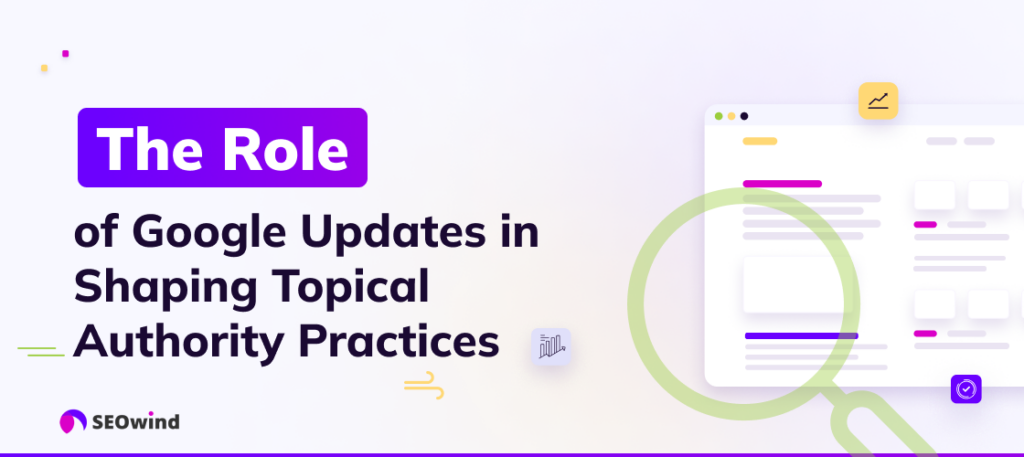
Google’s algorithm updates have played a pivotal role in shaping how we approach topical authority in SEO. These updates, often named after animals or other quirky monikers, have consistently pushed website owners and content creators to focus on providing comprehensive, high-quality content that serves user needs.
Landmark Updates: Hummingbird and BERT
One of the most significant updates in this regard was the Hummingbird update in 2013. This update marked a shift from keyword-focused SEO to topic-based SEO. It introduced semantic search, allowing Google to understand the context and intent behind queries, rather than just matching keywords. This change laid the groundwork for the importance of topical authority we see today.
The BERT update in 2019 further refined Google’s ability to understand natural language. This update emphasized the need for content that addresses user queries in a natural, conversational manner. It reinforced the importance of creating assets that cover topics comprehensively rather than just targeting specific keywords.
The Evolution of E-A-T to E-E-A-T
More recently, Core Updates have continued to prioritize high-quality, authoritative content. These updates have often resulted in significant ranking fluctuations, with sites demonstrating strong topical authority typically seeing improvements in their rankings.
The introduction of E-A-T (Expertise, Authoritativeness, Trustworthiness) guidelines, which later evolved to include Experience, has also been crucial in shaping topical authority practices. These guidelines emphasize the importance of demonstrating genuine expertise and first-hand experience in your content. In December 2022, Google updated its quality rater guidelines to include an additional “E” for Experience, evolving the concept to E-E-A-T (Experience, Expertise, Authoritativeness, Trustworthiness).
This shift to E-E-A-T underscores Google’s increasing emphasis on first-hand experience and practical expertise. It encourages content creators to not only demonstrate theoretical knowledge but also show real-world application and understanding of topics. This change has significant implications for topical authority, as it favors content created by those with direct, practical experience in their field.
For example, a review of a product by someone who has actually used it extensively would be valued more highly than a review based solely on specifications. Similarly, advice on a medical condition from a doctor who regularly treats patients with that condition would be considered more authoritative than general information from a health website.
Passage Ranking and Its Impact on Content Structure
Google’s passage ranking, introduced in 2021, further underscores the importance of in-depth, well-structured content. This feature allows Google to rank specific passages from a page, even if the overall page isn’t the most relevant for a query. This change encourages content creators to cover topics thoroughly, including relevant subtopics that might answer specific user queries.
The consistent thread through all these updates is clear: Google is continually refining its ability to identify and reward high-quality, authoritative content that comprehensively covers topics relevant to user queries. As a result, SEO practices have had to evolve from focusing on individual keywords to building genuine topical authority.
In response to these updates, successful SEO strategies now involve:
- Creating comprehensive content that covers topics in-depth
- Structuring content logically with clear headings and subheadings
- Using natural language that addresses user intent
- Demonstrating expertise and experience in the subject matter
- Building a network of interlinked content that covers related subtopics
As Google continues to update its algorithms, we can expect the emphasis on topical authority to grow even more vital. Future updates are likely to further refine Google’s ability to assess the depth and quality of content, making it increasingly important for websites to establish themselves as authorities in their niche.
By staying informed about these updates and adapting our strategies accordingly, we can ensure that our approach to building topical authority remains aligned with Google’s evolving standards. This proactive approach helps improve search rankings and ensures we create content that serves our audience’s needs.
Best Practices for Sustaining and Growing Your Topical Authority

Building topical authority is not a one-time effort; it requires consistent work and strategic planning. Here are some best practices to help you sustain and grow your topical authority over time.
Regular Content Updates and Maintenance
Keeping your content fresh and up-to-date is crucial for maintaining topical authority. Search engines favor websites that consistently provide current, accurate information. Regularly review and update your existing content, especially cornerstone pieces. This practice helps maintain your authority and allows you to expand on topics as new information becomes available.
Select a wide breadth of topics
Don’t be afraid to expand your horizons. Explore related topics that complement your main subject areas. This approach allows you to create a more comprehensive knowledge base and demonstrates to search engines that your expertise extends beyond a narrow focus. Remember, the goal is to become a go-to resource for your entire niche, not just a single topic.
Write comprehensive content
When creating content, aim for depth and thoroughness. Comprehensive content that covers all aspects of a topic serves your audience better and signals to search engines that you’re a true authority. Don’t just scratch the surface; dive deep into subtopics, answer related questions, and provide valuable insights that can’t be found elsewhere.
Innovative Angles on Existing Topics
To stand out in a crowded digital landscape, look for unique angles on familiar topics. Can you offer a fresh perspective or new insights? Perhaps you can combine topics in an unexpected way or apply concepts from one field to another. This innovative approach helps you maintain your authority and attracts attention and engagement from your audience and other experts in your field.
Increase your publishing velocity
Consistency is key to building and maintaining topical authority. Aim to publish new content regularly. This doesn’t mean sacrificing quality for quantity; instead, it’s about finding a sustainable rhythm that allows you to consistently produce high-quality, valuable content. A steady stream of new content gives search engines more opportunities to crawl and index your site, reinforcing your authority over time.
Market your brand on other domains
While creating great content on your website is crucial, keep the power of external marketing in mind. Guest posting on reputable sites in your niche, participating in industry forums, and engaging in social media discussions can all help to reinforce your authority. These activities bring more eyes to your content and help build valuable backlinks, further solidifying your position as an authority in your field.
By implementing these best practices, you’ll be well-positioned to sustain and grow your current level of topical authority over time. Remember, building topical authority is a marathon, not a sprint. Stay committed to producing high-quality, valuable content, and your efforts will pay off in improved search rankings and increased trust from your audience.
How Can You Tell A Website Has Topical Authority?

Identifying a website with strong topical authority isn’t always straightforward, but there are several key indicators you can consider. These signs collectively paint a picture of a site that’s recognized as an authoritative source in its niche. Let’s explore these indicators in detail.
A Strong, Authoritative Domain
A website with topical authority often starts with a strong, authoritative domain. This doesn’t necessarily mean it’s an old or well-known brand, but rather that it has built a reputation for quality content over time. Look for domains that have a history of consistently publishing in-depth, valuable content in their niche.
As highlighted by Wix SEO, “Authoritative, experienced authors are a key part of the topical authority equation, as emphasized by Google’s search quality evaluator guidelines.” This means that websites featuring content from recognized experts in the field are more likely to have strong topical authority.
Robust Internal Link Profile
A website with topical authority typically has a well-structured internal linking strategy. This means you’ll see a network of interlinked content that guides users (and search engines) through related topics. Look for sites that have:
- Clear topic clusters with pillar pages and supporting content
- Logical navigation that makes it easy to explore related subjects
- Contextual links within content that lead to more in-depth information on specific subtopics
This interconnected content structure demonstrates a comprehensive understanding of the subject matter and helps establish the site’s authority on the topic.
Number of Ranking Keywords
While not a definitive measure on its own, the number of ranking keywords can be a good indicator of topical authority. A site with strong topical authority will typically rank for a wide range of keywords related to their niche, including:
- High-volume, competitive keywords in their main topic areas
- Long-tail keywords that address specific questions or subtopics
- Related keywords that demonstrate the breadth of their expertise
You can use SEO tools like SEMrush or Ahrefs to check the number and quality of keywords for which a site ranks.
Great Content
Perhaps the most important indicator of topical authority is the quality of the content. Websites with true topical authority consistently produce content that is:
- Comprehensive: Covering topics in-depth and from multiple angles
- Accurate: Providing up-to-date, factual information
- Valuable: Offering unique insights or solutions to user problems
- Well-structured: Organized in a logical, easy-to-navigate manner
- Engaging: Written in a way that keeps readers interested and encourages them to explore further
When examining a website’s content, look for material that goes beyond surface-level information. Authoritative sites often provide unique research, expert opinions, or practical applications you won’t find elsewhere.
Remember, topical authority isn’t about having a single great piece of content but a collection of high-quality, interconnected assets that comprehensively cover a topic area. By looking at domain strength, internal linking, keyword rankings, and content quality, you can get a good sense of whether a website has topical authority in its niche.
Measuring Your Site’s Topical Authority – Tools and Metrics
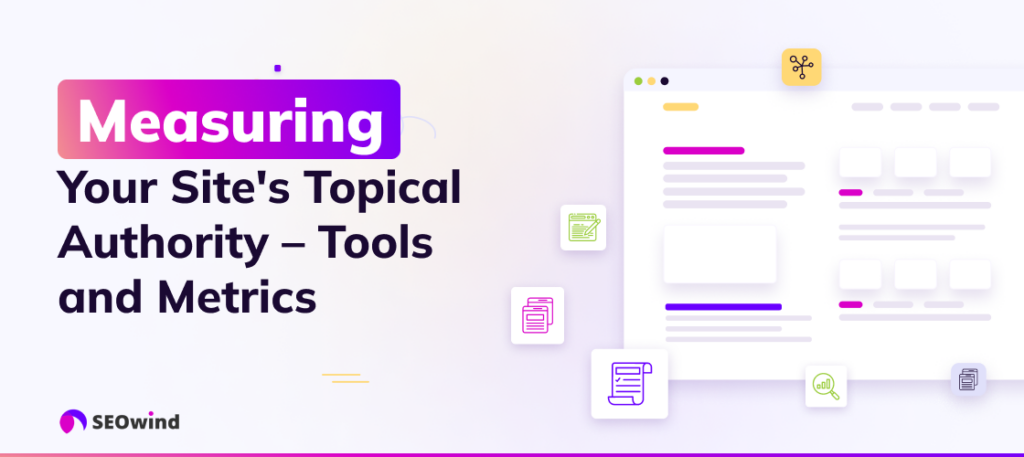
Assessing your website’s topical authority can be complicated, but there are several tools and metrics you can use to get a good sense of where you stand. Let’s explore some of the most effective ways to measure and track your site’s topical authority.
Keyword Overview
A comprehensive keyword overview is crucial for understanding your site’s topical authority. Tools like SEMrush, Ahrefs, or Moz can provide valuable insights into your keyword performance. Look for:
- The number of keywords you’re ranking for within your niche
- The diversity of these keywords (long-tail, short-tail, question-based)
- Your ranking positions for key topic-related terms
A site with strong topical authority will typically rank for a wide range of keywords related to its core topics, including many long-tail variations. Pay special attention to keywords for which you’re ranking in the top 3 positions, as these are strong indicators of your authority on those specific topics.
Backlink Analysis
Backlinks are still a crucial factor in determining a site’s authority. When measuring topical authority, focus on:
- The quality and relevance of sites linking to you
- The anchor text used in these backlinks
- The specific pages on your site receiving the most backlinks
Look for backlinks from other authoritative sites within your niche. These are particularly valuable for building topical authority. Tools like Majestic, Ahrefs, or Moz’s Link Explorer can help you conduct a thorough backlink analysis.
Position Tracking
Position tracking tools allow you to monitor your rankings for specific keywords over time. This is particularly useful for tracking your progress in building topical authority. Set up monitoring for:
- Your main topic keywords
- Related subtopic keywords
- Long-tail variations of your core topics
By monitoring these over time, you can see how your efforts to build topical authority are impacting your search rankings. Look for overall trends rather than day-to-day fluctuations.
Google Analytics
While Google Analytics doesn’t directly measure topical authority, it provides valuable data that can indicate how well you’re establishing authority in your niche:
- Organic traffic growth: An increase in organic traffic to topic-related pages can indicate growing authority.
- User behavior metrics: Look at metrics like time on page, bounce rate, and pages per session. Improved engagement can suggest that users find your content authoritative and valuable.
- Landing page performance: Monitor which pages are bringing in the most organic traffic. Content that consistently attracts visitors for topic-related queries likely demonstrates topical authority.
Remember, no single metric or tool can give you a complete picture of your topical authority. The combination of these different data points will provide the most accurate assessment. Regularly review these metrics, looking for trends and patterns over time rather than focusing on short-term fluctuations.
By consistently monitoring these tools and metrics, you can gain valuable insights into your site’s topical authority. Use this information to guide your content strategy, identify areas for improvement, and track your progress as you work to establish your site as a go-to resource in your niche.
Common Pitfalls to Avoid While Pursuing Topical Authority
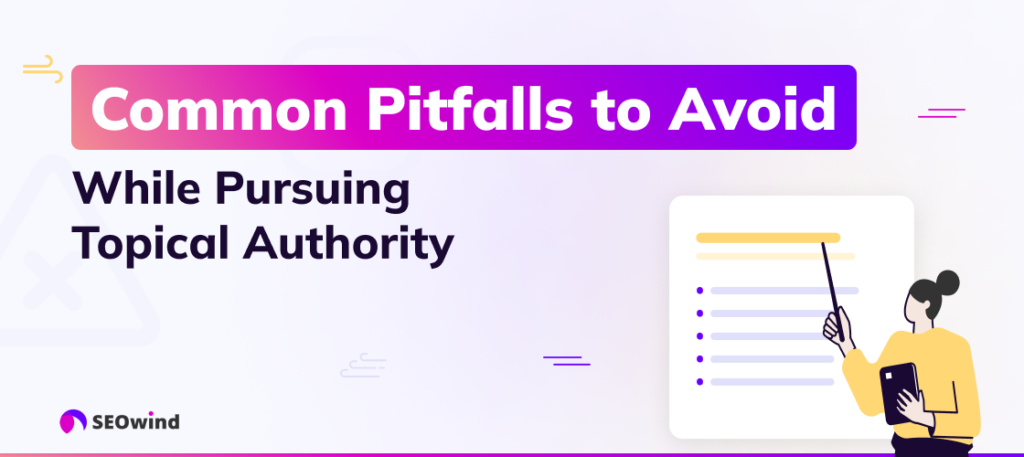
While building topical authority is crucial for SEO success, several common mistakes can hinder your progress. Being aware of these issues can help you avoid them and stay on track.
Content Quality and Strategy
- Focusing on quantity over quality: One of the biggest mistakes is churning out a large volume of shallow content. Remember, topical authority isn’t about how much you publish, but how well you cover a topic. Always prioritize depth and value over sheer volume.
- Neglecting user intent: Creating content without considering what your audience is looking for can lead to poor engagement and rankings. Always research and address the user intent behind every topic you cover.
- Ignoring content structure: Poorly organized content can confuse users and search engines. Ensure your content is well-structured with clear headings, subheadings, and a logical flow of information.
- Sticking to a single content format: Relying solely on one type of content (like blog posts) can limit your reach. Diversify your content types to include videos, infographics, podcasts, and more to cater to different user preferences.
- Copying competitors instead of innovating: While it’s good to know what your competitors are doing, simply copying their approach won’t set you apart. Strive to infuse your content with unique perspectives and insights.
- Spreading yourself too thin: Trying to establish authority across too many topics at once can dilute your efforts. Focus on becoming an authority in one area before expanding to others.
- Overlooking the importance of E-E-A-T: Failing to demonstrate Experience, Expertise, Authoritativeness, and Trustworthiness in your content can hinder your authority-building efforts. Always strive to showcase these qualities in your content.
Technical and On-Site Optimization
- Failing to interlink content: Not connecting your related pieces of content through internal linking is a missed opportunity. Proper interlinking helps establish topic clusters and reinforces your authority on a subject.
- Overlooking mobile optimization: With mobile-first indexing, neglecting mobile optimization can severely impact your topical authority. Ensure your content is easily readable and navigable on mobile devices.
- Ignoring technical SEO: Even the best content can struggle to rank if your site has technical issues. Don’t neglect aspects like site speed, mobile-friendliness, and proper indexing.
Content Maintenance and Promotion
- Neglecting content updates: Failing to keep your content fresh and up-to-date can erode your authority over time. Regularly review and update your content, especially cornerstone pieces.
- Failing to promote your content: Creating great content is only half the battle. Not actively promoting your content can limit its reach and impact. Develop a solid content promotion strategy to amplify your efforts.
By being aware of these common pitfalls and actively working to avoid them, you can streamline your efforts to build topical authority. Remember, establishing yourself as an authority in your niche is a long-term process that requires consistent effort, strategic planning, and a commitment to providing value to your audience. Stay focused on creating high-quality, comprehensive content that serves your users’ needs, and you’ll be well on your way to establishing topical authority.
The Future of Topical Authority: Trends and Predictions for SEO

As we look ahead, it’s clear that topical authority will continue to play a crucial role in SEO. Here are some trends and predictions for the future of topical authority in SEO:
Content Creation and Optimization
- AI-driven content creation and optimization: As AI technologies like GPT-4 become more sophisticated, we’ll likely see an increase in AI-assisted content creation. This could lead to more comprehensive coverage of topics and raise the bar for what’s considered authoritative content. SEO professionals will need to focus on adding unique human insights and experiences to stand out.
- Increased emphasis on E-E-A-T: Google’s focus on Experience, Expertise, Authoritativeness, and Trustworthiness will likely intensify. Websites will need to go beyond just providing information and demonstrate real-world expertise and first-hand experience in their content.
- Visual and video content authority: With the growing popularity of visual platforms and video content, establishing topical authority will extend beyond text. Expect more emphasis to be placed on video SEO and image optimization as part of building comprehensive topical authority.
Search Technology Advancements
- Voice search optimization: As voice-activated devices become more prevalent, optimizing for conversational queries will become increasingly important. This will require a deeper understanding of natural language processing and user intent.
- Semantic search advancements: As search engines improve their understanding of context and the relationships between topics, the importance of comprehensive topic coverage and interconnected content will grow.
- Multimodal search capabilities: As search engines evolve to understand and process multiple types of input (text, voice, image), establishing authority across different content formats will become crucial.
Personalization and User Experience
- Hyper-personalization: Search engines are likely to become even better at understanding individual user preferences and contexts. This could lead to more personalized search results, making it crucial for websites to cater to specific audience segments within their niche.
- Integration of user-generated content: User reviews, comments, and discussions could play a larger role in establishing topical authority. Websites that effectively incorporate and moderate user-generated content may gain an edge.
- Mobile-first content authority: With mobile-first indexing already in place, the future will likely see an even greater emphasis on mobile optimization. This could include factors like load speed, user experience, and mobile-specific content formats.
Localization and Real-Time Information
- Local topical authority: For businesses with a physical presence, establishing topical authority within a specific geographic context will become increasingly important.
- Real-time authority: The ability to provide up-to-date, real-time information on rapidly changing topics could become a significant factor in establishing and maintaining topical authority.
Emerging Technologies
- Blockchain for verifying authority: We might see the emergence of blockchain-based systems for verifying the credibility and authority of content creators and sources.
To stay ahead in this evolving landscape, SEO professionals and content creators will need to:
- Continuously update their skills and knowledge
- Invest in diverse content formats
- Focus on creating genuinely valuable, experience-based content
- Stay agile and ready to adapt to new technologies and search engine updates
- Prioritize the user experience across all devices and platforms
The future of topical authority in SEO is likely to be more complex but also more rewarding for those who can establish themselves as authoritative sources in their niches. By staying informed about these trends and continuously refining your strategies, you can position yourself at the forefront of SEO success in the years to come.
FAQs

What is topical relevance?
Topical relevance refers to how closely related a piece of content is to a specific topic or theme. In the context of SEO, it’s about creating content that aligns with the subject matter your website focuses on. A high degree of topical relevance means that your content comprehensively covers various aspects of your main topic and related subtopics.
Topical relevance is a crucial component of topical authority. It’s not just about creating content on a specific subject but ensuring that your content forms a cohesive topical structure. This structure should include main topics, subtopics, and supporting content that all work together to demonstrate your expertise in a particular area.
What is semantic SEO?
Semantic SEO is an approach to search engine optimization that focuses on the meaning behind words and phrases rather than just the keywords themselves. This means understanding the intent behind a search query and creating content that comprehensively answers the user’s questions.
In semantic SEO, the emphasis is on:
- Creating content that covers a topic in-depth
- Using related terms and concepts (not just exact-match keywords)
- Structuring content in a way that makes sense to both users and search engines
- Providing context and connections between different pieces of content
Semantic SEO is closely tied to topical authority because it encourages a more holistic approach to content creation. By focusing on meaning and context, you naturally build a more comprehensive topical structure, which in turn enhances your topical authority.
What is website authority?
Website authority measures how trustworthy and credible a website is in the eyes of search engines. It’s not an official metric used by search engines but rather a concept developed by SEO professionals to understand how well a site might perform in search results.
Website authority is influenced by various factors, including:
- The quality and quantity of backlinks from other reputable sites
- The age of the domain
- Overall content quality
- User engagement metrics
- The site’s topical authority in its niche
While website authority considers a site’s overall credibility, topical authority focuses on its expertise in specific subject areas. A site can have high overall authority but low topical authority in certain areas, or vice versa.
It’s important to note that building topical authority can contribute significantly to improving overall website authority. By consistently producing high-quality, in-depth content on specific topics, you demonstrate expertise and credibility, which can lead to more backlinks, better user engagement, and, ultimately, higher website authority.
Understanding topical relevance, semantic SEO, and website authority is crucial for developing a comprehensive SEO strategy. They all work together to help you build a strong online presence, improve your search rankings, and establish your site as a go-to resource in your niche.
